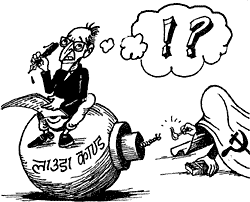 The national flag carrier has been trying for months to lease an aircraft, but to no avail. Royal Nepal Airlines has become such a pariah in international aviation circles that nobody wants to touch it with a barge pole. The airline had been flying through bumpy weather for years, but what made it lose all credibility was the scandal involving the lease of a Boeing 767 from Lauda Air in 2000.
The national flag carrier has been trying for months to lease an aircraft, but to no avail. Royal Nepal Airlines has become such a pariah in international aviation circles that nobody wants to touch it with a barge pole. The airline had been flying through bumpy weather for years, but what made it lose all credibility was the scandal involving the lease of a Boeing 767 from Lauda Air in 2000. The word Lauda, along with other international brand names like Pajero, has become a short-hand for corruption in high places. The UML, which was then in the opposition, disrupted the entire winter session of parliament in 2001, demanding the resignation of Prime Minister Girija Prasad Koirala for his alleged involvement in the Austrian aircraft lease. Everyone was baying for Koirala's blood.
The CIAA served the premier a letter asking him to furnish some 'clarifications'. Koirala finally quit on 19 July 2001, to be replaced by Sher Bahadur Deuba in his second tenure as prime minister.
Public memory being what it is, there may be very few today who remember the smear campaign that was run in the name of Lauda to bring down the Koirala government. But its political fallout was similar to that of the Bofors gun deal in India that ousted Rajiv Gandhi from power. Till date, the octogenarian Nepali Congress president carries a whiff of Lauda. The case is still pending at the courts and it may be too early to write off all allegations with any certainty but a review of those tumultuous days reveal the wheeling and dealing of power politics in Nepal.
Sore at being ousted from Singha Darbar, Krishna Prasad Bhattarai was trying to get back at his good friend Koirala. Some of his sidekicks at Royal Nepal Airlines were miffed at the Lauda lease since it deprived the carrier's 757 crew of lucrative allowances. Competing commission agents offered a voracious media comparative cost charts to prove that they had better rates.
Ambitious Deuba used it as an opportunity to play factional politics inside the ruling party against his mentor and leaked details to a pliant press. The UML saw it as an opportunity to divide the ruling party and exploited it to the hilt. Civil society wanted to test the power of its fangs and pounced upon a victim already wounded by the political attacks. The scandal suited the needs of several power players. In the end, no one won. Everyone lost.
The Lauda affair was proof that political forces go to any length, sacrifice anything, use any weapon against an opponent even if it meant hurting the country and its institutions.
Beholden to those who had helped him claw his way into Singha Darbar, Deuba did their bidding by refusing to extend the term of local government units, declaring a state of emergency, crippling his political party, dissolving parliament and finally recommending the suspension of general elections before being dismissed as an incompetent prime minister by the king.
Madhab Kumar Nepal's dreams of benefiting from the split in the ruling party did not materialise as the October Fourth royal move swept him into the sidelines. The CIAA is yet to regain the credibility it lost in pursuing a lost cause. Kantipur has buried the Lauda hatchet for good and prominent hacks responsible for the operation have moved on. Its front-page editorials of that period can still be read in libraries and are examples of partisanship. Bhattarai has deservedly become a laughing stock.
Local agents of Lauda Air and their political sponsors milked the deal to the last drop, pocketing a cut for every hour that the jet was in the air and then dumped the scandal on a hapless state airline. This intelligently planned and cleverly implemented campaign in the name of fighting corruption offers proof-if proof is still needed-that all is fair in politics. After all, politics is what you do, propaganda is how you do it. For its lasting impact, just look at Girija Prasad Koirala today still struggling four years later to convince King Gyanendra that he has a clean image.



